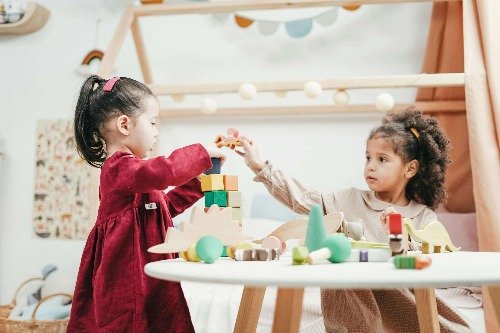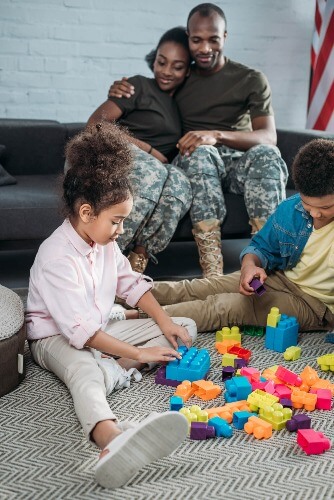What Do Parents Do?: A Helpful Guide to the Role of Parenthood
Are you wondering, "what do parents do?" As parents, you will wear many hats and play numerous roles in your children’s lives. From caregivers to teachers, counsellors to cheerleaders there are a wide range of responsibilities and duties to consider.
Let's take a closer look at some of the tasks that parents do every day and how these tasks are helping to contribute to your child’s well-being and development.
What Do Parents Do?
1. You Teach:
You are your child’s first teachers. It's important that you teach your children life skills like walking and talking as well as values like kindness, respect and honesty.
Teaching is not just about what they learn in school. It’s about sharing what you know, it’s about introducing values and being a good role model for them.

2. You Provide Structure and Routine:
You meet their basic needs, like, food, shelter, clothing, bathing, dressing and healthcare. You provide comfort and affection creating a safe and loving environment for your kids.
As a parent you will provide nurturing which involves both emotional and physical care.
When your children need you, you will be there for them while helping them with their needs and creating a strong bond of love and support.
3. You Guide Your Children:
You serve as a guide, helping your children figure out the difficulties in life.
As parents you offer advice and provide guidance to help your kids make the best possible decisions. You also share your wisdom if they want to hear it.
4. You Promote Health and Safety:
Health and safety is top priority for most parents. Promoting health and safety involves preventive measures like providing a safe environment to live.
You promote safety rules and model heathy habits. It’s about taking the appropriate steps to keep your child safe and healthy.
5. What Do Parents Do? You Balance Life:
Balancing work, family life and taking care of yourself involves time management and setting priorities.
It's about making the most of the time you have with your children and finding a solution that works for a balanced life.
6. You Teach Values and Morals and Affection:
You teach your children honesty, about respecting others, empathy and integrity helping them to develop into responsible individuals.
Offering emotional support, physical affection and creating a safe and secure home environment will make your child feel loved and valued.
7. You Set Boundaries and Discipline:
To teach your children right from wrong, it is necessary to establish rules and boundaries into their life. When these boundaries are crossed, consequences are required.
It may not seem like it at the time, but this will teach your child about responsibility, self-discipline and respect. Discipline is not about punishment, its about setting clear expectations and consistent guidance.
8. You Nurture Creativity and Imagination
You inspire your child’s creativity and curiosity by encouraging them to use their imagination through play.

Providing opportunities for them to be creative and exposing them to new experiences and ideas.
You will help build their self-esteem by exploring their interests and talents. It’s all about developing your child’s natural curiosity and lifelong love of learning.
9. You are Role Models for Your Children:
Always be aware of your actions, children learn best by observing how you behave. Be kind, empathetic, honest and strong, be the kind of person you want your children to become.
10. What Do Parents Do? You Encourage Independence:
When they are young you just want to protect your children from physical and emotional harm and we still do as they get older.
However, as they grow it is up to you to encourage their independence, so that they can learn to protect themselves.
Guide them to solve their own problems and make their own choices. By taking on age appropriate responsibilities they can build confidence and self-determination.
11. You Advocate for Their Needs:
You make sure that your child’s needs and rights are met. Whether it’s at school, in the community, healthcare or whatever it may be.
What do parents do? You stand up for your children and make sure they have what they need to thrive as they grow older.
12. You Support Learning and Development:
You learn to adapt to your child’s changing needs as they grow and develop. You read to them and get involved in engaging activities with them.
Their needs will constantly change and you need to change with them.
13. You Support Emotional Well-being:
You provide a supportive ear to your children, listening to their thoughts, feelings and concerns.
Emotional support involves active listening, not so much active talking though.
Offering guidance and advice only when they ask for it. It’s mostly about being present and mindful to your child’s emotional needs, helping them to trust and feel secure.
14. You Build Strong Relationships With Them:
Family is important for a child’s social development, and feelings of belonging.
Spending quality time together is encouraged, promoting strong bonds and creating lasting memories.
As their parent we are helping them to create meaningful relationships with family, friends and community members.

15. You Celebrate Achievements and Milestones:
As parents you celebrate just about anything your child achieves. It could be one of their many milestones, first steps, first words, or academic accomplishments.
You are their cheerleaders and want to let them know how proud you are of them, boosting their self-confidence and motivating them.
In conclusion: Parenting requires love, patience and dedication, where you are playing an important role in the lives of your children.
While sometimes challenging, the rewards outweigh those challenges making every effort worthwhile as you witness the growth, development and achievements of your children with love and pride.
Side Note: All the happiness and affection between you and your child out weigh any amount of chaos making it all worthwhile.
From the very first moment you lay your eyes on your little one to the endless memories you share together, being a parent is a unique journey that changes you in ways you can never imagine.
So, to all the parents out there, take a moment to celebrate the unconditional love that connects you to your children. And remember, you're doing an amazing job, even on the most difficult days!























New! Comments
Have your say about what you just read! Leave me a comment in the box below.